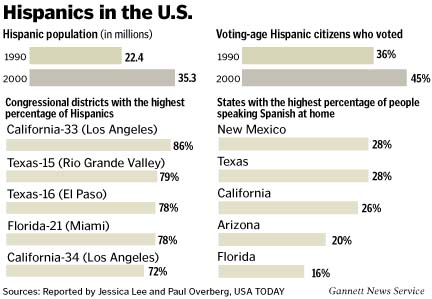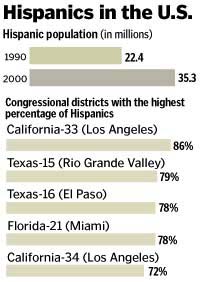|
 |
|
Esta página no está disponible en español. USA TODAYGOP, Democrats Court Latino VoteLawmakers take Spanish lessons, launch TV show to woo Hispanics, now seen as major power brokersBy Jessica Lee
MAY 12, 2002 WASHINGTON -- In what could be a pivotal election year, Republicans and Democrats are making their most concerted effort ever to speak to Latino voters in a language they appreciate: "Espanol."
The reason: political necessity, if not survival. Since the 2000 Census documented a 58-percent increase in the nation's Hispanic population during the last decade, from 22.4 million in 1990 to 35.3 million, Latinos have gone from virtual impotence on the political scene to potential power broker. The number of Latino citizens voting grew by 18 percent from 5 million in 1990 to 5.9 million in 2000. The 2000 Census found 157 congressional districts with at least 10-percent Latino residents. One of every 10 U.S. residents speak Spanish at home; that number rises to one of every four residents in Texas, New Mexico and California, the Census Bureau says. With both houses of Congress almost evenly divided, lawmakers are fighting for every vote this year. Democrats could lose control of the Senate if the GOP gains one seat. Republicans could lose the House if The direct appeals to Latino voters have increased since the 2000 presidential race, when George W. Bush and Al Gore sprinkled Spanish phrases into their campaign speeches. Last year, New Jersey Gov. James McGreevey trounced his GOP opponent with a campaign that included political advertisements for Spanish-language broadcast outlets. In Texas this year, the two Democratic candidates for governor held a debate in Spanish. The penetration of Univision, Telemundo and other Spanish-language broadcasts into Hispanic households has helped prompt lawmakers to learn Spanish. Surveys show that "40 percent of Hispanics using television on any day are tuned in to Spanish-language TV," says Karen Kratz of Nielsen Media Research. In cities such as Los Angeles and Miami, "the Spanish-language networks frequently compete equally and beat the general-market networks," says Joe Peyronnin, head of Telemundo Network News. "That explains why lawmakers are taking Spanish. They're getting to the audience." Inevitably, some candidates who speak Spanish while campaigning mangle the language. That's usually forgiven, Rep. Ileana Ros-Lehtinen, R-Fla., says. "People ... laugh and say, 'What a great effort.'" Rep. Silvestre Reyes, D-Texas, who chairs the Congressional Hispanic Caucus and easily switches between English and Spanish, says his colleagues are "identifying it as a priority to be able to speak to this constituency, because if they don't, somebody else will." Two mornings each week, six House Democrats pore over textbooks and workbooks. "Bway-NOH? Bway-NOH? Bway-NOH?" they repeat in unison, mimicking the sounds of Basil Malish, a teacher from the government's adult-education program. He notes that "bueno," which means "good," is how many Latinos answer the phone -- rather than "hola," Spanish for "hello." Republicans cannot afford to be left behind, says former House speaker Newt Gingrich, the political strategist credited with leading the Republican Party to its first House majority in 40 years. He has studied Spanish and calls Hispanics "the absolute pivotal constituency for either party." House Republicans have no organized Spanish lessons. But many lawmakers are taking it upon themselves to learn the language. Rep. Heather Wilson, R-N.M., started taking Spanish almost a year ago under a tutor who visits her Albuquerque office twice a month. "About half my constituents speak Spanish at home," the New Hampshire native says.
|

 The Republican National Committee's announcement last week that it will launch a monthly Spanish-language TV show to woo Hispanics is the latest example in a political battle of one-upmanship. Twice weekly, half a dozen House Democrats huddle in a private office steps from the Capitol Rotunda for an hour of Spanish lessons. The Republican National Committee recently finished a 10-day Berlitz Spanish course for state party officials and is offering to pay tuition for other party leaders.
The Republican National Committee's announcement last week that it will launch a monthly Spanish-language TV show to woo Hispanics is the latest example in a political battle of one-upmanship. Twice weekly, half a dozen House Democrats huddle in a private office steps from the Capitol Rotunda for an hour of Spanish lessons. The Republican National Committee recently finished a 10-day Berlitz Spanish course for state party officials and is offering to pay tuition for other party leaders. Democrats gain six seats.
Democrats gain six seats.